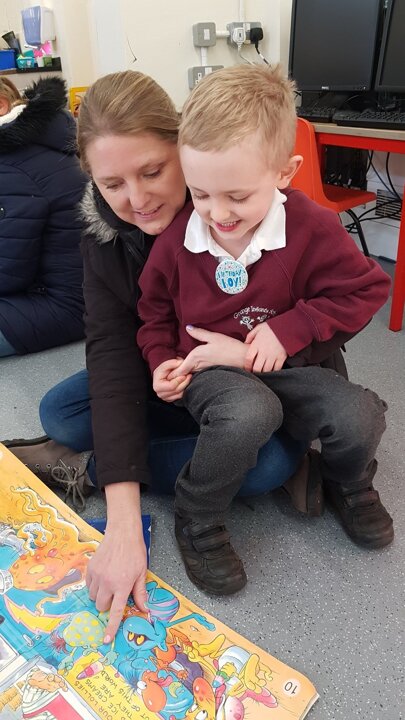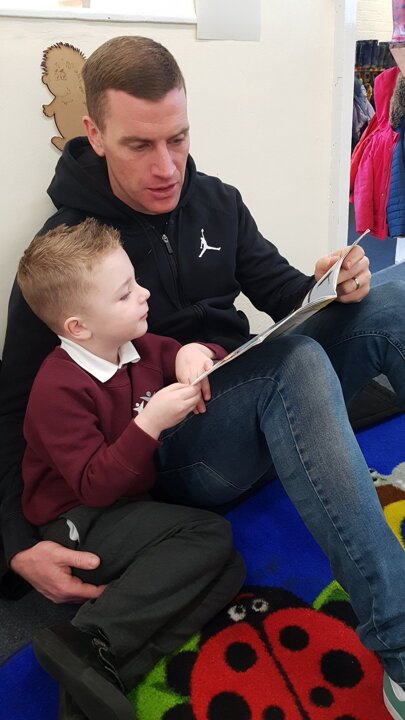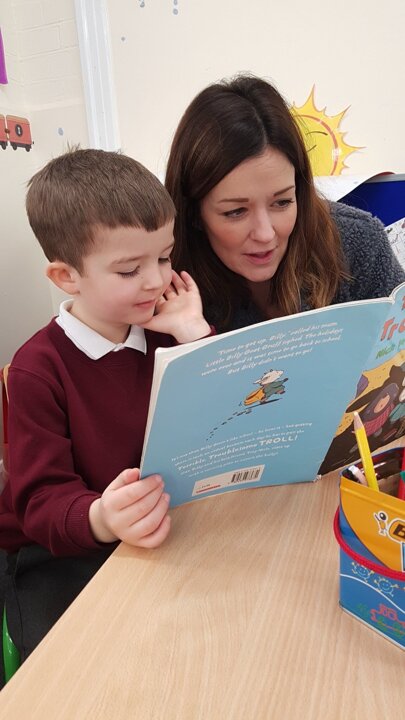Phonics and Reading
At Grange Infant School we believe that for all our children to become fluent readers and writers, phonics must be taught through a systematic and structured phonics programme.
We use the Little Wandle Letters and Sounds Revised to plan and provide daily engaging phonics lessons. In phonics, we teach children that the letters of the alphabet represent a different sound, that these can be used in a variety of combinations and are put together to make words. The children learn to recognise all the different sounds and combinations that they might see when they are reading or writing. Our phonics teaching starts in Reception and follows a very specific sequence that allows our children to build on their previous phonic knowledge and master specific phonic strategies as they move through school. As a result, all our children are able to tackle any unfamiliar words that they might discover. At Grange Infants we also model these strategies in shared reading and writing both inside and outside of the phonics lesson and across the curriculum. We have a strong focus on the development of language skills for our children because we know that speaking and listening are crucial skills for reading and writing in all subjects.
How we teach phonics
- In reception, children follow the progression within Little Wandle Letters and Sounds Revised program. At the beginning of the year, the focus is on daily oral blending moving on to blending with flashcards and then reading whole words on flashcards. We also focus on language development through high quality stories and rhymes.
- In Y1, children follow and continue the progression within Little Wandle Letters and Sounds Revised programme.
- Phonics is taught daily and there is a review session on a Friday.
- Phonics starts in reception in week 2 to ensure the children make a strong start.
- By the end of reception, children will have been taught up to the end of phase 4.
- By the end of year 1, children will have been taught up to the end of phase 5.
- Reception lessons start at 10 minutes, with daily additional oral blending – increasing to 30 minutes as soon as possible.
- Y1 lessons are 30 minutes long.
- In Y2 phonic lessons are taught daily to children where appropriate – following the model of Little Wandle but plugging specific gaps identified through assessment.
- In Y2 and for children new to school, there are planned phonic ‘catch-up’ sessions following a set model to address specific reading/writing gaps. These are short, sharp sessions lasting 10 minutes in length and taking place at least three times a week.
Programme Overview
Reading practice sessions
- Children across reception, year 1, year 2 apply their phonics knowledge by using a full matched decodable reader in a small group reading practice session.
- These sessions are 15 minutes long and happen three times a week. There are approximately 6 children in a group.
- The sessions follow the model set out in Little Wandle Letters and Sounds Revised.
- The children then take the same book home the following week to ensure success is shared with the family.
- In reception these sessions start in week 4. Children who are not decoding, do a little blending lesson, following the model set out in Little Wandle Letters and Sound Revised.
How do we assess phonic knowledge?
- In reception and year 1, at the end of each week there is a review session which recaps the learning. There are also whole review weeks (pre-planned and bespoke review weeks to address gaps identified by the class teacher’s ongoing formative assessment).
- Children identified in reception and Y1 as in danger of falling behind are immediately identified and daily ‘keep up’ sessions are put in place – sessions follow the Little Wandle Letters and Sounds Revised programme.
- In reception and year 1, the children are assessed at the end of every half term using the Little Wandle Letters and Sounds Revised assessment tracker.
- The children in Y1 sit the Phonics Screening Check in the summer term. However, due to the pandemic, in the last two academic years the PSC has been moved to be taken by Y2 children at the end of the Autumn term.
- Children who do not pass the Phonics Screening Check in Y1(Y2 this year) will re-sit this in Y3.
- Children who are in Y2 and need ‘catch up’ sessions are assessed through teacher’s ongoing formative assessment as well as half termly summative assessments.
If you are a parent and would like more information about how to support your child with phonics at home, please follow this link to find the Reception and Year 1 overview as well as videos of the sound pronunciations, letter formation sheets and other helpful resources.
https://www.littlewandlelettersandsounds.org.uk/resources/for-parents/

Parents Workshop Presentation
Love of Reading
At Grange Infant School we give children the best start we can by teaching them to read as soon as possible so that they can develop a love of reading that will provide them with the skills they need for the future.
Right from the beginning of their time at Grange Infants, children access a range of high-quality engaging texts across a range of genres. Each term they have access to the school library where children can explore a variety of books that can be chosen to take home and shared with their families. Participate in local reading competitions including the summer reading challenge. Take part in Book fairs where children are timetabled in for browsing sessions. Participate in World Book Week dress up and enrichment events based on the national theme. Reading treat half termly for children that have been reading regularly at home.
Alongside this each class has a class text that they read for pleasure each day and a weekly assembly is held to promote reading for pleasure, understanding of different authors and the range of books they have written. Daily opportunities to engage in quality book talk.
Teacher Commitment:
- Teachers who have regular training sessions and are kept up to date with pedagogical developments.
- Enthusiastic teachers with good knowledge of children’s books and enjoy participating in book talk.
- Teachers who are motivated and participate wholeheartedly in reading enrichment activities such as World Book Day.
- Teachers who model the love of reading!


